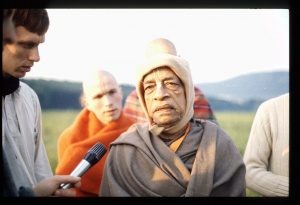CC Adi 10.89 (1975): Difference between revisions
(Vanibot #0027: CCMirror - Mirror CC's 1996 edition to form a basis for 1975) |
(Vanibot #0020: VersionCompareLinker - added a link to the Version Compare feature) |
||
| Line 2: | Line 2: | ||
<div style="float:left">'''[[Sri Caitanya-caritamrta (1975)|Śrī Caitanya-caritāmṛta (1975)]] - [[CC Adi (1975)|Ādi-līlā]] - [[CC Adi 10 (1975)|Chapter 10: The Trunk, Branches and Subbranches of the Caitanya Tree]]'''</div> | <div style="float:left">'''[[Sri Caitanya-caritamrta (1975)|Śrī Caitanya-caritāmṛta (1975)]] - [[CC Adi (1975)|Ādi-līlā]] - [[CC Adi 10 (1975)|Chapter 10: The Trunk, Branches and Subbranches of the Caitanya Tree]]'''</div> | ||
<div style="float:right">[[File:Go-previous.png|link=CC Adi 10.88 (1975)|Ādi-līlā 10.88]] '''[[CC Adi 10.88 (1975)|Ādi-līlā 10.88]] - [[CC Adi 10.90 (1975)|Ādi-līlā 10.90]]''' [[File:Go-next.png|link=CC Adi 10.90 (1975)|Ādi-līlā 10.90]]</div> | <div style="float:right">[[File:Go-previous.png|link=CC Adi 10.88 (1975)|Ādi-līlā 10.88]] '''[[CC Adi 10.88 (1975)|Ādi-līlā 10.88]] - [[CC Adi 10.90 (1975)|Ādi-līlā 10.90]]''' [[File:Go-next.png|link=CC Adi 10.90 (1975)|Ādi-līlā 10.90]]</div> | ||
{{CompareVersions|CC|Adi 10.89|CC 1975|CC 1996}} | |||
{{RandomImage}} | {{RandomImage}} | ||
==== TEXT 89 ==== | ==== TEXT 89 ==== | ||
| Line 32: | Line 31: | ||
<div class="purport"> | <div class="purport"> | ||
Although it is not only in western India that people were contaminated by association with Muslims, it is a fact that the farther west one goes in India the more he will find the people to be fallen from the Vedic culture. | Although it is not only in western India that people were contaminated by association with Muslims, it is a fact that the farther west one goes in India the more he will find the people to be fallen from the Vedic culture. Even until five thousand years ago, when the entire planet was under the control of Mahārāja Parīkṣit, the Vedic culture was current everywhere. Gradually, however, people were influenced by non-Vedic culture, and they lost sight of how to behave in connection with devotional service. Śrīla Rūpa Gosvāmī and Sanātana Gosvāmī very kindly preached the bhakti cult in western India, and following in their footsteps the propagators of the Caitanya cult in the Western countries are spreading the saṅkīrtana movement and inculcating the principles of Vaiṣṇava behavior, thus purifying and reforming many persons who were previously accustomed to the culture of mlecchas and yavanas. All of our devotees in the Western countries give up their old habits of illicit sex, intoxication, meat-eating and gambling. Of course, five hundred years ago these practices were unknown in India-at least in eastern India-but unfortunately at present all of India has been victimized by these non-Vedic principles, which are sometimes even supported by the government. | ||
</div> | </div> | ||
Latest revision as of 14:26, 26 January 2020

A.C. Bhaktivedanta Swami Prabhupada
TEXT 89
- paścimera loka saba mūḍha anācāra
- tāhāṅ pracārila doṅhe bhakti-sadācāra
SYNONYMS
paścimera—on the western side; loka—people in general; saba—all; mūḍha—less intelligent; anācāra—not well behaved; tāhāṅ—there; pracārila—preached; doṅhe—Śrīla Rūpa Gosvāmī and Sanātana Gosvāmī; bhakti—devotional service; sad-ācāra—good behavior.
TRANSLATION
The people in general on the western side of India were neither intelligent nor well behaved, but by the influence of Śrīla Rūpa Gosvāmī and Sanātana Gosvāmī they were trained in devotional service and good behavior.
PURPORT
Although it is not only in western India that people were contaminated by association with Muslims, it is a fact that the farther west one goes in India the more he will find the people to be fallen from the Vedic culture. Even until five thousand years ago, when the entire planet was under the control of Mahārāja Parīkṣit, the Vedic culture was current everywhere. Gradually, however, people were influenced by non-Vedic culture, and they lost sight of how to behave in connection with devotional service. Śrīla Rūpa Gosvāmī and Sanātana Gosvāmī very kindly preached the bhakti cult in western India, and following in their footsteps the propagators of the Caitanya cult in the Western countries are spreading the saṅkīrtana movement and inculcating the principles of Vaiṣṇava behavior, thus purifying and reforming many persons who were previously accustomed to the culture of mlecchas and yavanas. All of our devotees in the Western countries give up their old habits of illicit sex, intoxication, meat-eating and gambling. Of course, five hundred years ago these practices were unknown in India-at least in eastern India-but unfortunately at present all of India has been victimized by these non-Vedic principles, which are sometimes even supported by the government.